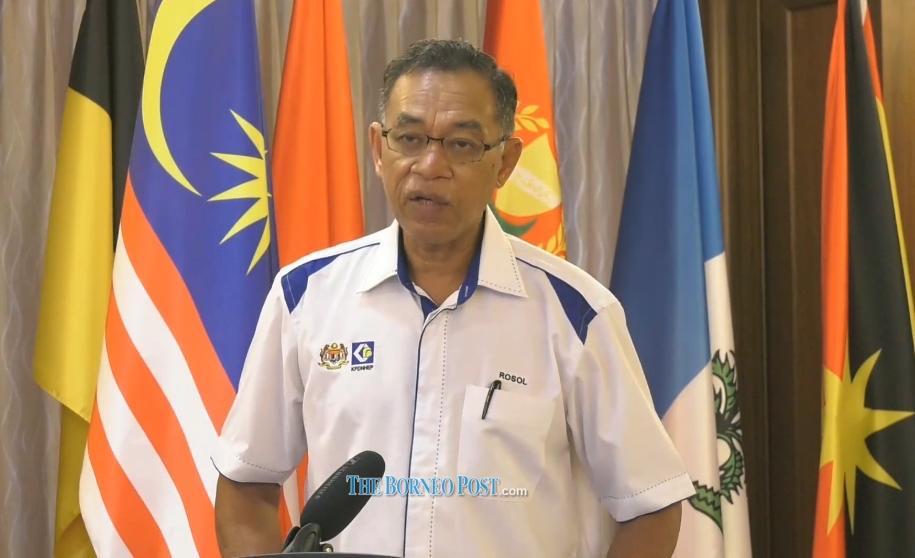Rosol delivers his speech before virtually launching the campaign.
KUCHING (July 16): Complaints on online transactions made up 45.2 per cent of total complaints received by the Domestic Trade and Consumer Affairs Ministry as of June this year, said deputy minister Datuk Rosol Wahid.
He said while the government is promoting the development of eCommerce, it is also a double-edged sword as fraud, scams, and other cyber-crimes via eCommerce and digital platforms have increased directly, correlating with digital business success.
(For the freshest news, join our Telegram Channel)
“In 2020 alone, there were a total of 11,511 (33.2 per cent) complaints on online transactions recorded by the Ministry, which is an increase compared to 5,416 (24.7 per cent) complaints received in 2019.
“These complaints have been steadily rising, and as of June 2021, it was one of the most frequent complaints received by the Ministry at 45.2 per cent of total complaints,” he said when launching the #TakNakScam campaign via Zoom organised by Facebook, in collaboration with the ministry, the police, and other government agencies today.
Rosol pointed out that during the Covid-19 pandemic, consumers moved dramatically towards online channels, notably eCommerce, and that the government also recognises the increase of these online activities and eCommerce, especially when the Movement Control Order came into force.
“The Malaysian eCommerce market has seen amplified growth of 32.7 per cent in 2020, accelerated by the Covid-19 pandemic itself. This, along with the growing consumer preference for simplified, accessible, and varieties of payment options, further drives the eCommerce market growth in Malaysia.
“In addition to that, Malaysia’s eCommerce growth has provided opportunities for upcoming merchants to operate; therefore, creating job and investment opportunities. In 2020, Malaysia had one of the highest internet penetration rates in Southeast Asia,” he said.
Rosol said unfortunately the ministry also recognised that the eCommerce acceleration rate has created more opportunities for fraud and abuse.
He said that the ministry has played an active role including law enforcement and consumer awareness engagement in various forums.
“Both the government and private sectors must prepare to prevent an impending wave of fraud and if there are not any drastic measures taken, the online scams will affect consumer confidence severely, among others,” he said.
Rosol said a more holistic approach is needed to curb this issue, involving collaborations between government agencies and the private sector.
As such, he said the collaboration between the government and Facebook is very much welcomed and commendable, and that the government fully supported the #TakNakScam campaign initiated by Facebook Malaysia.
“Facebook, as a leading social media platform in Malaysia, has shown good initiative to collaborate with various government agencies by leading a path and providing an opportunity for the public sector and private sector to work together to raise awareness, encourage more engagements and empower them to take action under the #TakNakScam campaign.
“The #TakNakScam campaign will be ongoing for three months, starting from July until September. We hope for a fruitful and successful outcome where the government will continue to support this initiative to protect consumers from fraud and deception,” he said.
Justin speaks about the campaign.
In his welcoming remarks, Facebook Malaysia interim country director Justin Murugaya said police statistics showed that cybercrime in Malaysia is rising at an alarming level.
“A total of 67,552 cyber scam cases in the last five years from 2017 to June 2021, recording a total loss of RM2.23 billion. This includes 23,011 eCommerce scams, 21,008 illegal loans, and 6,273 investment scams.
“The most prevalent financial scams in Malaysia are bank or governmental impersonation, illegal loans, money mules, and investment scams,” he said, while warning of scams that are becoming more sophisticated and believable.
Justin said it is more important than ever for the public and private sectors, industries, and consumer associations to come together to combat scams.
“We hope that the #TakNakScam campaign will help drive conversations amongst everyday Malaysians to raise awareness, educate and encourage critical thinking, and empower them to take action by reporting scams to relevant authorities.
“We also hope that this campaign will support the goals of various government bodies, financial service industries, NGOs, and law enforcement in building a stable online ecosystem in Malaysia,” he said
Among those present during the virtual launch were Commercial Crime Investigation Department (CCID) Cyber Crime and Multimedia Investigation deputy director SAC Victor Sanjos, Bank Negara Malaysia (BNM) Penang office head Hasjun Hashim, and Federation of Malaysian Consumers Associations (Fomca) deputy secretary Nur Asyikin Aminuddin.
The #TakNakScam campaign is a joint effort between the Ministry of Domestic Trade and Consumer Affairs, CCID of the Royal Malaysia Police, Bank Negara Malaysia, Securities Commission Malaysia, Bursa Malaysia Berhad, Malaysian Communications and Multimedia Commission, Cyber Security Malaysia, The Association of Banks in Malaysia, Fomca, and the Education and Research Association for Consumers Malaysia.
The objective of this nationwide campaign is to help raise awareness, encourage critical thinking, and empower the public to take action through streamlined and easy to understand messaging under the joint main #TakNakScam campaign.

